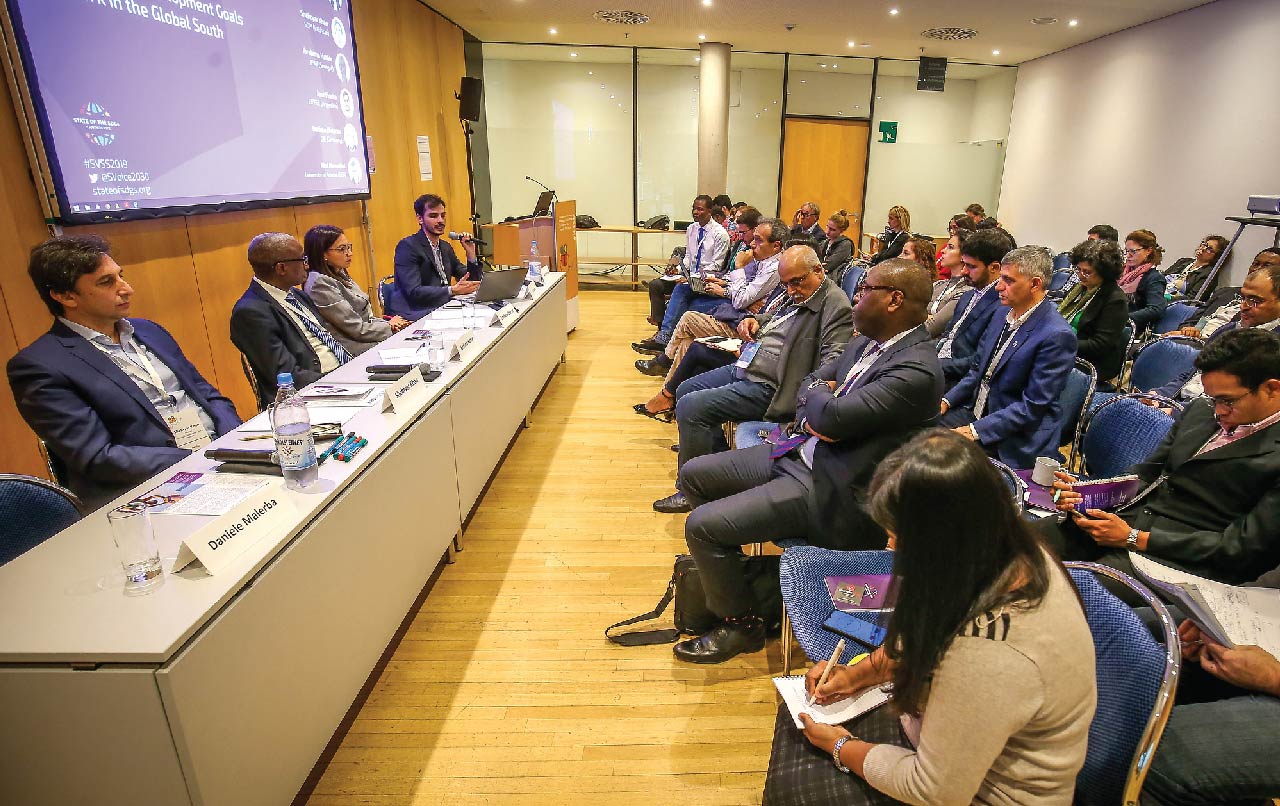Dates: November 15 and 16, 2018 Venue: Pullman Bangkok King Power Hotel 8/2 Rangnam Road, Thanon-Phayathai, Ratchathewi 10400 in Bangkok,…
As part of the State of the SDGs (SVSS) initiative, Southern Voice hosted a panel at the 19th Global Development Conference in Bonn, Germany. During the session, called “Putting the Sustainable Development Goals to work in the Global South”, panellists presented and discussed the preliminary findings of the SVSS global report. The interactive discussion allowed Southern Voice researchers to exchange views and perspectives with a diverse audience.
The State of the SDGs report explores the barriers and solutions to the achievement of the 2030 Agenda. The report focuses on understanding the nature of exclusion (Leave No One Behind) in the Global South, the interconnections between Goals, and the global issues that shape the adoption of the SDGs at the national level. These three layers of analysis seek to complement the existing data-driven analysis of progress and identify what we see as ‘second generation challenges’.
The panellists were Ibrahima Hathie (IPAR), Jose Florito (CIPPEC), and Shehryar Khan (SDPI). Estefania Charvet (Southern Voice) moderated the panel, and Daniele Malerba (DIE) and Atal Ahmadzai (University of Arizona) participated as discussants.
Exclusion is much more complicated than we might realise
Exclusion is more complicated than ever. Individuals and groups experience overlapping forms of discrimination which deeply constrain their capabilities and opportunities to lead decent and fulfilling lives. Traditional views on exclusion might not be enough to understand how it looks like to be left behind in the Global South. As progress is achieved in certain areas, unintended consequences threaten to exclude other, less ‘traditional’ groups. For example, gender gaps in access to education in Latin America are closing. But young, urban men, traditionally considered ‘better off’ in terms of economic returns of education, are seeing these benefits reduce steadily. In several countries of the region, they face difficulties in accessing the labour market. This raises questions around the quality of education provided and the underlying social problems that remain unsolved. Similar dynamics were found in other regions.
In light of these challenges, the panel highlighted the importance of intersectionality. Individuals and groups face combined social discrimination or exclusion. Policy-making needs to be transformative to provide long-term solutions to the difficulties those furthest behind face. It needs to address the requirements of the most vulnerable at the national and sub-national levels.
Synergies and trade-offs analysis for more coherent policy-making
The interconnected nature of the 2030 Agenda does not mean that all actions and targets support the achievement of all Goals. In some cases, the possibility to achieve one Goal can undermine the progress of another. The panel discussed the dynamic and policy actions to address this challenge.
The analysis of synergies and trade-offs should be mainstreamed into policymaking as a strategy to encourage the adoption of coherent policies. By not looking at the entire picture, governments lose opportunities to untap synergies. They also risk being affected by the unforeseen consequences of incoherent policies. In the face of limited fiscal resources, more awareness about synergies and trade-offs across SDGs can also support governments’ efforts to reach the people and groups left furthest behind.
For synergies and trade-offs across SDGs to become a part of policymaking, more policy coherence at the national and sub-national level is required. Besides political commitment, other aspects can support the efforts of national governments to design and implement more coherent approaches to the SDGs. Integrated actions to respond to interconnected outcomes at the social, economic and environmental level should be accompanied by long-term planning. It should go beyond electoral cycles, focus on stronger institutions and more effective resource allocation systems.
Global concerns
Global systemic concerns directly impact the ability of countries to implement the SDGs successfully. Changes happening at the global level can directly impact national and subnational contexts. This can create challenges hard to face for many countries in the Global South. Take, for example, technology and the impact it has on employment and skills generation. Many countries in the Global South might have to adapt to the demands of the 4IR with limited available resources and skills.
For this reason, it is essential to understand better how global issues affect the abilities of countries and households to adopt the 2030 Agenda. It is also vital to recognize how to prevent that these global dynamics affect the most vulnerable. The panel emphasised the importance of partnerships and collaboration between countries. Multi-stakeholder partnerships and global cooperation could tackle the negative impacts of global issues.
—
The briefing with the preliminary findings of the Global Report can be found here. The Global Report will be launched in January 2020.


